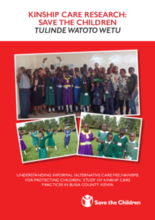This participatory research confirms that kinship care is widely practiced in many Kenyan communities as noted through the participatory engagement with communities in Busia County. Cultural practices and ways of life in many communities placed a high value on care for kin’s children, which was seen as critical to safeguarding children, and to keeping the family lineage alive. Historically there have been cultural norms, values and a togetherness that kept marriages and family ties strong. However, socio economic pressures and challenges that accompany urbanisation and modernisation have negatively affected family unity, resulting in a more individualistic outlook to life and living. This distance and isolation in families does not augur well for children’s wellbeing, especially where parents are incapacitated in one way or another in carrying out their primary role.
This research has found that there are both negative and positive outcomes for children living in kinship care. Some children experience a sense of belonging, love, care and protection in extended families, and have their basic needs and rights met. In contrast, other children experience discrimination, mistreatment and are not having their basic needs and rights met. This denotes that there are inherent strengths and risks within kinship care relations and it is crucial to build upon the strengths and resilience of children and caregivers, and to reduce the risks faced to ensure children’s wellbeing, care and protection.

